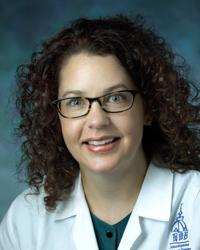-
Samuel Alaish, MD

- Surgical Director, The Hopkins Resource for Intestinal Vitality and Enhancement (THRIVE)
- Associate Professor of Pediatric Surgery
-
Darla R. Shores, MD PhD

- Medical Director, The Hopkins Resource for Intestinal Vitality and Enhancement (THRIVE)
The Hopkins Resource for Intestinal Vitality and Enhancement

The Hopkins Resource for Intestinal Vitality and Enhancement (THRIVE) is a center for pediatric intestinal rehabilitation. THRIVE is dedicated to the care and study of children with intestinal failure, a condition marked by insufficient gut tissue (short bowel syndrome) or poor gut function due to acquired or congenital disease. Without functioning intestines, children can’t receive enough nourishment by mouth and require IV feedings, known as parenteral nutrition (PN).
Our Approach to Quality Care
In both the inpatient and outpatient setting, we optimize nutrition that is given though both the intestine and IV to help the intestine regain as much function as possible and to reduce the risks of liver disease that can be associated with IV nutrition. Our intestinal rehabilitation team is involved early in the care of infants with newly diagnosed intestinal failure. We partner with our home nursing team to facilitate family education of central line care to reduce the risk of infection and need for hospitalization. We track growth, use of medications, the length of time IV nutrition is needed, oral feeding skills, frequency of infections and hospitalization, liver disease and how chronic illness can impact quality of life.
Our Multidisciplinary Care Team
Research has shown that children receive better care in multidisciplinary clinics, and the THRIVE clinic provides expertise from multiple subspecialties involved in pediatric intestinal rehabilitation. THRIVE physicians and staff include Samuel Alaish, the center’s surgical director, pediatric gastroenterologist and intestinal failure specialist Darla Shores, medical director (who also sees children in the Inflammatory Bowel Disease Center), and Johns Hopkins pediatric specialists in nutrition, nursing, speech therapy, social work, occupational therapy, behavioral psychology and pharmacy. THRIVE coordinates each child’s care and offers a unified approach for the family to optimize overall care. Specialists include:
- Jenifer Thompson, M.S., R.D., C.S.P., L.D.N., is an advanced practice dietician with expertise in pediatric nutrition therapy and monitoring of patients receiving specialized home enteral and parenteral therapy.
- Lynn Mattis, R.N., M.S.N., is a pediatric clinical nurse specialist with expertise in patient education about central line, enteral tube and ostomy care and administration of feedings, parenteral nutrition and medications. She is also the clinic coordinator and facilitates discharge planning.
- Margie Birdsong, C.P.N.P., W.C.O.C.N, is a pediatric surgical nurse practitioner with expertise managing gastrostomy tubes, ostomies, wound care and biofeedback therapy.
- Kari Allan, Pharm.D., is a pediatric clinical pharmacy specialist supporting the nutritional and pharmaceutical treatment of pediatric patients with short gut and long-term gastroenterology needs, including parenteral nutrition management.
Clinic Appointments
The THRIVE clinic currently sees children the first Friday and fourth Monday of every month in the David R. Rubenstein Child Health Building at Johns Hopkins Children's Center. For more information or to make an appointment, contact the pediatric scheduling line at 443-997-5437 (KIDS), or call Lynn Mattis, R.N., M.S.N., at 410-614-6080.
The THRIVE clinic is available to all intestinal failure patients 18 years or younger. The majority of patients will be dependent on some (and possibly full) parenteral nutritional support. Please Note: Children and teens with inflammatory bowel disease are cared for in our Inflammatory Bowel Disease Center.
Research
Translating science into action
Within the THRIVE center, scientists led by Johns Hopkins’ pediatric surgeon-in-chief David Hackam are engaged in research to improve existing bowel function and also develop artificial intestines.
At “the epicenter” of clinical and basic science at Johns Hopkins, intestinal surgeon Samuel Alaish and his colleagues are developing an in-depth focus on the basic science of short gut syndrome. “In this current era of reduced federal budgets for research, we now need philanthropic funding more than ever before to sustain current research, jump start innovative projects and educate providers and others in the community and across the nation as to what is required for the proper care of these children,” he says.
Hackam and others are already working to regenerate intestinal tissue in the lab — possibly to cure these patients. “We believe THRIVE will be a living example of translating science into action,” Dr. Alaish says.
In his lab at Johns Hopkins, Dr. Alaish is working to discover more effective and less toxic treatments for intestinal infections than today’s traditional antibiotic therapy. In addition to promoting bacterial resistance and making pathogens impervious to drugs, antibiotics can encourage the growth of hard-to-treat fungal infections. Alaish conducts basic science research related to intestinal failure with a focus on the bacteria in the gut and how it effects the intestines.
“These kids are prone to having the bacteria in their gut invade and spread to cause infections in the rest of their bodies,” he says. “To prevent these infections, the current therapy is to put them on antibiotics to keep the bacteria down in their intestines. At THRIVE, we will be able to characterize the gut bacteria, and thus, the success of this treatment by looking at their stools. We can then use this information to modify our antibiotic choice.”
This is just one example of the type of outcomes research the new center will perform.

